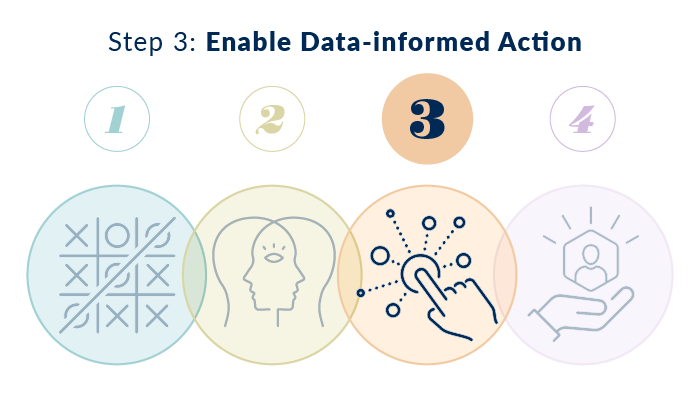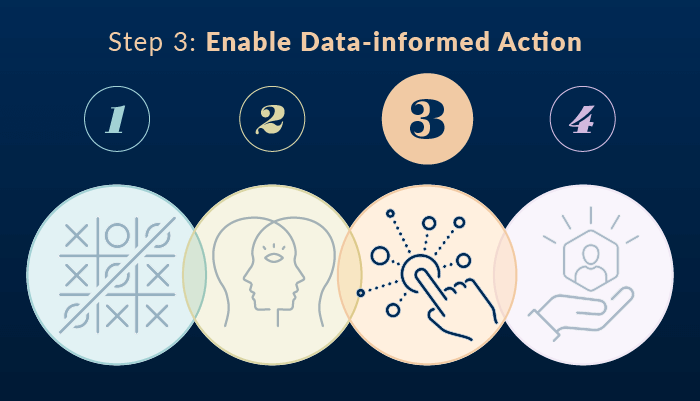Student success has always been a primary goal of higher education institutions. With unprecedented demographic and social changes, colleges and universities now face even more pressure to develop student success models that help students thrive academically and help institutions thrive financially.
Achieving sustainable student success requires intentionality and planning at the highest levels. Our research into how institutions develop financially sustainable student success models reveals that the most effective models are living processes that intentionally knit together strategic decision-making, cross-functional collaboration, data-informed action, and consistent assessment of initiatives and outcomes.
Here we explore the third step of an iterative, strategic approach to student success that has yielded significant returns on investment (4-5 times ROI) for some of our partner institutions. In this step, leaders enable data-informed action to achieve institution-specific, proactive student success interventions.

Institutions prioritizing historical and demographic data to coordinate student success struggle to provide proactive, personalized support at scale. Because they rely on static measures of success rather than dynamic metrics–such as relative LMS engagement and real-time persistence predictions–, it’s harder to identify students who need support in time to influence a better outcome.
Campuses experiencing the highest return on their investment in student success are making significant strides toward proactive and personalized student support by enabling frontline student success professionals to take data-informed action that supports holistic student care.
Achieving Financial Stability Leadership Brief
Use Dynamic, Real-Time Indicators to Guide Student Success Efforts
Institutions prioritizing the use of actionable analytics—such as students’ average LMS engagement relative to their peers and in-term fluctuations in their likelihood to persist—unlock a powerful mechanism to monitor student success in real time. This allows frontline professionals like advisors to intervene quickly to make a real difference in their students’ journeys.
Despite caseloads ranging from 250 to 325 students per advisor, advisors at Lorain County Community College (LCCC) use actionable insights—instead of disjointed data points—to prioritize outreach to students who are least likely to persist. Access to real-time insights about their particular students enabled them to uncover barriers and risks faster and precisely understand the root cause of student challenges.
Advisors can filter their caseloads daily to see immediate changes in predicted persistence and tailor communications to meet the needs of different students. Advisors are so in tune with their students’ needs they often find that differences in student predictions make them aware of student issues before faculty submit early alerts.
Thanks to these proactive efforts, LCCC has avoided historic enrollment declines experienced by other community colleges in recent years and has seen a 90% increase in degrees and certificates conferred since 2011.
Institutions that achieve the best return from student success initiatives ensure that their people and processes use real-time insights to inform and support action rather than relying on data only to help them understand the past.
Using Analytics to Reach Persistence and Graduation Goals
Segment Student Data to Gain Deeper Insights and Precision
Knowing which strategies offer the best support to specific groups of students empowers your teams to confidently and proactively intervene when students are struggling. This precise, institution-specific intelligence moves your student success model from a generalized strategy built on vague notions of what’s working to a model tailored to your institutional context and student characteristics.
When Snow College accessed Initiative Analysis data to determine if all students benefit equally from a one-on-one advising experience, the answer was loud and clear. While all students benefit from personalized advising services, lower-performing students saw a 20% boost in persistence due to an individual advising meeting compared to a 3% lift among high-performing students.
With this knowledge, they adjusted their advising practices to fine-tune support for students who need it most. Snow advisors offer group advising sessions to high-performing students. Creating capacity for more personalized outreach and support for those students in the lower quartiles of success. Snow uses actionable insights to uncover new student groups who may be at risk, allowing them to bring support to previously unidentified at-risk populations. As a result, their student success model is more equitable and proactive.
Accessing this type of institution-specific, actionable data makes it possible to continuously calibrate your student success efforts to meet the unique needs of your students.
Student Success Analytics Reveal Opportunities to Deliver Personalized Support
Leverage a Holistic Student Record to Address Student Needs
Enabling data-informed action to support students requires understanding the whole student experience. This enables frontline student success professionals with the information they need to connect students to the right resources and supports when they need them most. Institutions seeing the greatest return on investment from their student success initiatives empower their teams to take data-informed action in their daily work.
Advisors at Northwest Missouri State University (NMSU) have achieved a more holistic approach to student support by using a single platform to monitor student progress, communicate with students, and document their outreach efforts.
Northwest’s advisors can access real-time academic data, such as in-term persistence indicators and relative LMS engagement, to provide just-in-time outreach. All student communications, case management notes, referrals, and follow-ups are made and managed within the Civitas Learning Student Impact Platform.
Access to a holistic student record empowers success professionals across campus to better understand student needs when they arise. This enables them to improve student outcomes by tailoring support instead of offering generalized resources and recommendations.
Integrated Approach to Student Success Leads to 8% Retention Lift
Achieving Financially Sustainable Student Success Through Data-Informed Action
To achieve financial stability, leaders must adopt data-activated student success models that improve student outcomes and generate net tuition revenue. This requires dynamic, institution-specific indicators of student success, a broad and deep understanding of what works for specific student populations, and systems that support collaboration, communication, and proactive interventions.
Data-informed action achieves proactive, just-in-time support driven by dynamic, real-time indicators of student engagement and success. Personalized support is available at scale because administrators and their teams have deeper and more precise knowledge of what challenges and what supports specific student populations.
By enabling data-informed action as part of a living, strategic approach to student success, higher education institutions can achieve holistic, proactive support at scale while generating positive ROI to ensure long-term fiscal health.
Achieving Financial Stability Leadership Brief
This is the third in a series on building a student success model that supports financial health. You can also explore how to develop a dynamic strategic plan and facilitate a collaborative success network.








